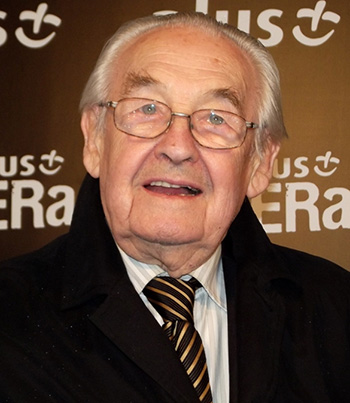
In Memory of Andrzej Wajda
USC Shoah Foundation is sorry to learn of the death of Andrzej Wajda, Poland’s preeminent filmmaker and the director of the 2002 USC Shoah Foundation documentary Pamiętam (I Remember). Wajda died October 9, 2016, at age 90.
Wajda survived World War II in Nazi-occupied Poland with his mother and brother after his father, a captain in the Polish infantry, was killed in the Katyn massacre. He joined the Polish resistance at 16 and served in the Polish Home Army until the end of the war.
As a young man, Wajda began establishing himself as a film director. His first three films A Generation (1955), Kanal (1957) and Ashes and Diamonds (1958) formed a trilogy about life in Poland during World War II. His Oscar-nominated film The Promised Land (1975) is an allegory of contemporary Communist politics through the depiction of 19th century capitalism, and subsequent films also explored themes of Communism and propaganda.
He received a second Oscar nomination for Katyn (2007), which is about the very massacre that killed his father.
Wajda also served one term in the Polish Senate after the collapse of Communism in 1989.
In 2002, USC Shoah Foundation produced the international television documentary series Broken Silence. Produced by James Moll, Broken Silence consists of five foreign-language films featuring testimonies from Argentina, the Czech Republic, Hungary, Poland, and Russia and directed by distinguished filmmakers from each of these countries. Wajda directed the Polish-language film Pamiętam (I Remember), about four survivors who were either helped or betrayed by their Polish neighbors.
The documentaries are unique in scope and construction: incorporating archival and modern-day footage, still photographs, original music, and drawing from the Institute’s testimonies. The film series, subtitled into 11 languages (including English), has aired on television in 18 countries worldwide. The series is now available on DVD.
Before the Visual History Archive was made accessible to people around the world on the Internet and at 67 (and counting) universities and museums, USC Shoah Foundation-produced documentaries like Broken Silence were the only way people could watch testimony. Wajda’s Pamiętam introduced millions of people to testimony years before the Visual History Archive became the easily-accessible tool for research and education that it is today.